Nate Moore has a young and exciting career as a producer for Marvel Studios. He began with behind-the-scenes short documentaries before becoming a co-producer on Captain America: The Winter Soldier, and then Exec producing both its followup Captain America: Civil War and now, Black Panther.
I meet Moore on the set of Civil War and noted how he was by far our best, longest, and most detailed interview for the film. The same is true for Black Panther when we visited the Atlanta set in February 2017 which you can see below. Our group conversation with Nate Moore covers the source material for the film adaptation, its changes to certain characters from Marvel Comics, the choice in director Ryan Coogler, details on Wakanda and Necropolis, and the importance of Black Panther to Hollywood and the Marvel Cinematic Universe.
Related: Black Panther Producer Reveals Why Wakanda Stayed Hidden
Where does this story begin?
Nate Moore: It begins where Captain America: Civil War left off, right? So obviously that movie had a big impact on T’Challa because of T’Chaka’s death. So now we answer the question, What happens when he goes home? Who rules Wakanda? How does Wakanda now deal with the loss of a king who was a fair king, who people seemed to like? And is T’Challa ready to be the king of Wakanda?
Branching off that, the thing that’s really interesting about Black Panther is the fact he, obviously, being royalty he has a certain dedication to Wakanda but being a world leader, he also has a responsibility to the rest of the world. How is that being balanced within this film?
Nate Moore: I think that’s the big question, Can you be a leader for a country and still be a hero? And still look out for the interests of the world when really you have a constituency that has a very specific agenda. In our world, unlike Publishing, Wakanda is a place where the rest of the world doesn’t know how advanced they are. So he’s trying to keep this veil of secrecy in this nation to keep them protected but morally, he understands that he could be doing more for the world and that’s the tension we play with.
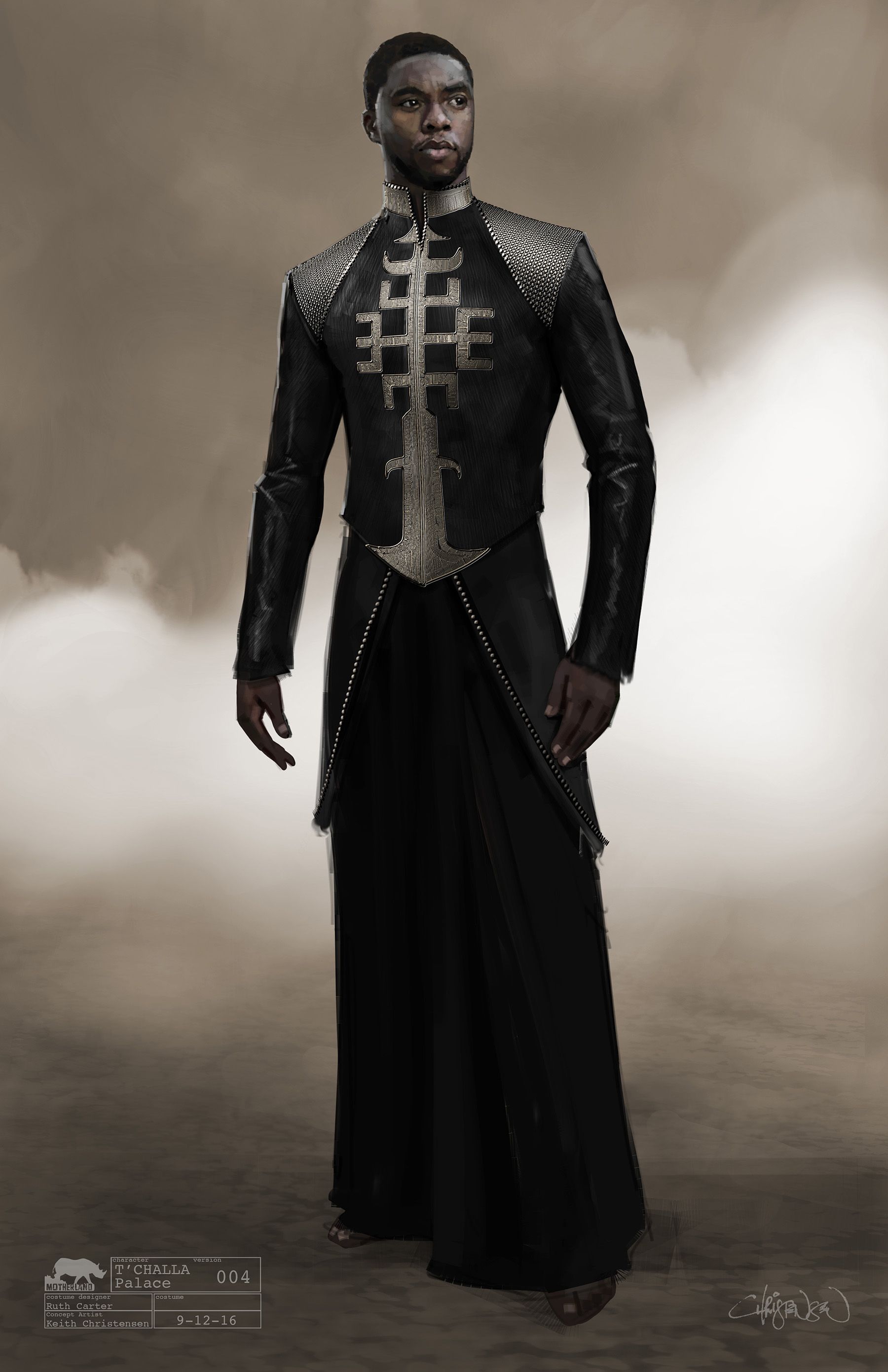
Obviously the mantle of King and the mantle of Black Panther are things that are passed down in Wakanda. How much is that going to be explored in the film as far as the Panthers that have come before him?
Nate Moore: It’s definitely a big piece of the movie and we wanted to explore how succession works in Wakanda. Again, in the Marvel Cinematic Universe, what was clear in Civil War and what we actually think was clear was that you could be king without being Panther and vice versa. So we always imagined T’Chaka was King but T’Challa already was Black Panther.
So what happens now when the Black Panther is next in line to be King? And are people going to be okay with him taking the mantle? Or is there going to be any resistance to that? It’s a big plot point in the movie. All of Wakanda is not monolithic. Everybody doesn’t agree about everything. Everybody doesn’t like the same people. So while some people may love the idea of T’Challa taking the mantle of king, other people may object to it and what happens then? How do you keep this country unified?
Can you talk about Erik Killmonger’s role? Is there a power play for him trying to take the mantle or that sort of thing?
Nate Moore: Yeah, I think for Killmonger it’s… Again, the interesting comparison we’ve been making, and this is going to sound crazy, but we’ve always thought of “Black Panther” as a James Bond kind of movie, right? Sort of this big globetrotting epic.
But in talking with Ryan Coogler, the director, one of the ideas he also liked was this sort of Godfather-kind of story. When I say Godfather, it’s the idea that it’s very much a story about family and a story about an organization where new leadership is taking place. And much like the Godfather, you have to fight for things, right? And they’re all vying for power and in this case, it’s power over Wakanda. I think Killmonger sees Wakanda as something that could be used differently than it currently is in the Marvel Cinematic Universe and that puts him directly at odds with T’Challa.
Do we get a sense of how the Wakandans regard T’Challa prior to him becoming King?
Nate Moore: You do in a way. And I say that because a big part of the beginning of the movie is this adjustment to life without T’Chaka. You see some of the other leaders in Wakanda and how they interact with T’Challa sort of indicates how they feel about him. And I think for him, this is a guy who wasn’t planning to be king any time soon. So he sort of being thrust into a leadership position almost before his time. So he’s not even sure if he’s the right leader for Wakanda.
How much will we see of his upbringing and his life up until Captain America: Civil War?
Nate Moore: You get a little bit of a sense of what it was like before when he was a kid. Honestly, it’s not a huge part of the movie but we did want to explore who he was before he was Panther.
So we get flashbacks?
Nate Moore: There are ways that we can explore the past in non-traditional storytelling, I will say. The world of Wakanda allows us to do some really cool cinematic things to take you back and fill you in on maybe what’s happened before.
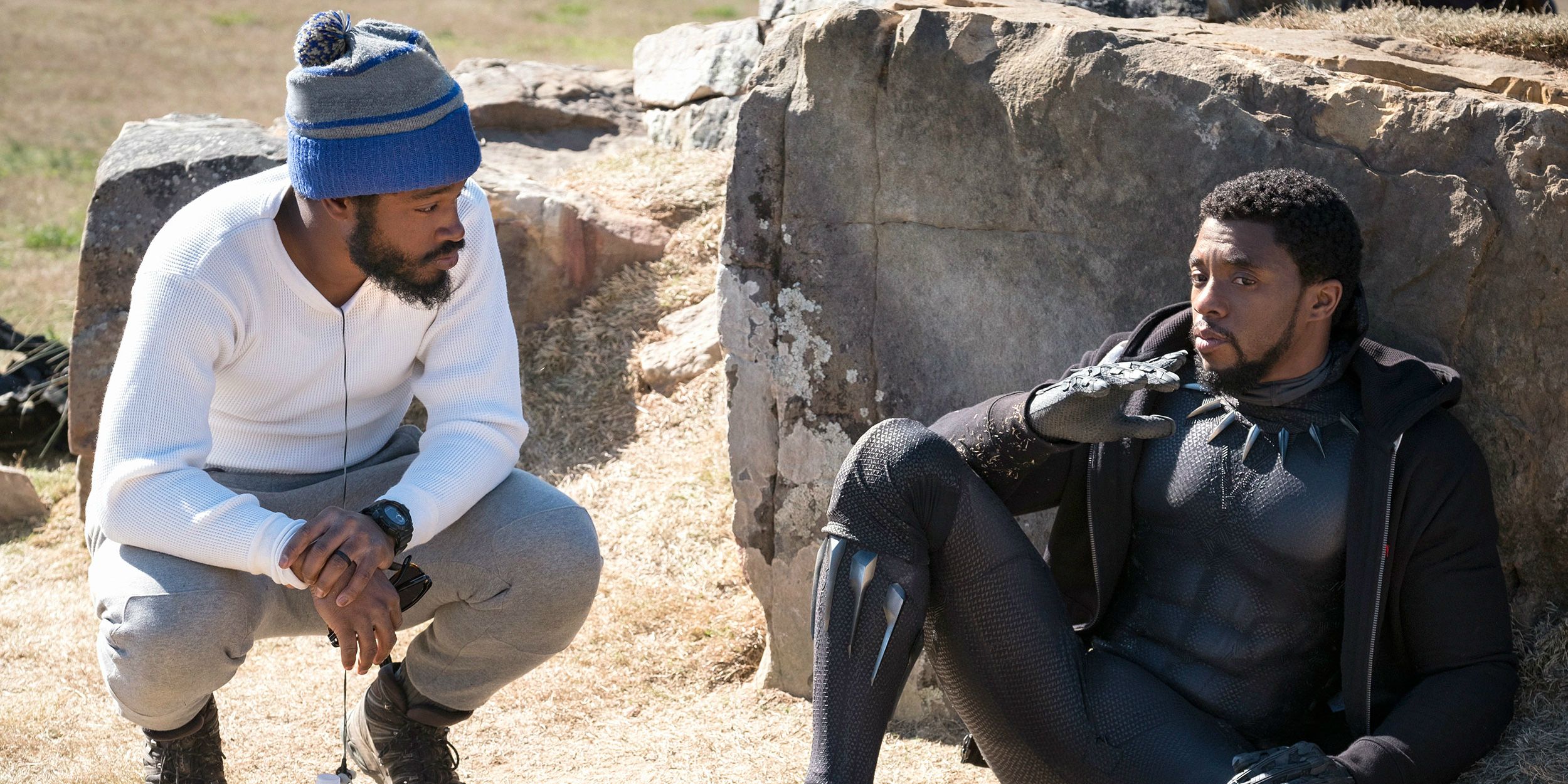
How did Ryan [Coogler] crack things open from what you and Marvel were planning to do? When he came in, what were the shifts that you saw?
Nate Moore: I think Ryan is a fantastic storyteller, specifically with character. We sort of knew the overall framework of what we wanted the movie to be. What he infused was a really good sense of the complications of being T’Challa and also really building out that supporting cast. One of the things that we love about the property of Black Panther is that there are so many interesting roles around him. Whether it be Ramonda, his mother; his sister, Shuri; Zuri, who is an advisor and a contemporary to T’Chaka’s and sort of a last link to his father. Ryan was really interested in exploring those relationships. Also, I think building out his relationship with the Dora Milaje, this group of all female, sort of Seal Team Six special forces women but making them all characters, making them all individuals rather than, again, this monolithic force of ass-kickers. That would be fun, and we’d always thought that’d be fun, but what we didn’t expect and what he really wanted to explore is the depth of the emotional connections between T’Challa and those individuals.
So there’ll be a lot more as far as their role in the story? That was my next question about the Dora Milaje.
Nate Moore: Yeah. They’re a big part of the movie. As you guys know Danai Gurira plays Okoye who, in our world, is the head of the Dora and a pivotal character in the movie. Exploring how they work, their role in Wakanda and their relationship with the King is a big part of the storytelling.
Is the betrothal aspect explored as well?
Nate Moore: It’s not. You know, that was sort of part of the original Christopher Priest run where they were all betrothed which we felt wasn’t necessary to tell the story of the Dora and in a way we all kind of rejected as being a little creepy. So we will not be exploring that.
Kind of off that idea, moving a little bit away from the comics, which Marvel Studios has consistently done, but the relationship between Killmonger and Klaue are obviously interlinked in the way we see in Avengers: Age of Ultron and Captain America: Civil War. It’s not going to be killing T’Chaka. I’m curious if there’s a relationship there?
Nate Moore: It’s definitely not the relationship you expect from reading the comics. And as you said, we like to be inspired by Publishing but we’re also building our own universe. I think Killmonger and Klaue have two very different agendas. They do not line up perfectly. Whether or not these guys have a relationship is something we want you guys to learn. But Klaue, in our mind, is very reminiscent of the Klaw in comics but clearly his genesis is totally different. Andy Serkis who started this week is an amazing performer and brings a different flavor to the tone of the film even than what Michael B. Jordan does. I think it’s going to be really fun.
You mentioned family as being a big part of this and that was a big part of both Priest’s run and Ta-Nehisi Coates’ current run. As is the political situation of the day, both of those runs have been very reflective of the world around them. How much is this movie going to be reflective of the obvious political turmoil we’re experiencing now?
Nate Moore: It’s interesting. I think the movie is inherently political. Just the idea of Wakanda being a nation in Africa that is the most technologically advanced in the world is a political statement without us having to go too much far past that. As to how political it will be when the film comes out next year, obviously we all know the political landscape is shifting so quickly it’s so hard to say. But when you’re dealing with an African character and the outside world, politics are inherently there. We don’t want to be too political. It’s not by any means a message movie. But I think people once they see the film will see the relevance in it. In the same way that [Captain America: The Winter Soldier] was without hopefully being too textual was talking about issues that we were all talking about in defense and information gathering and that kind of stuff. I think “Panther” will have similar echoes of what’s happening.
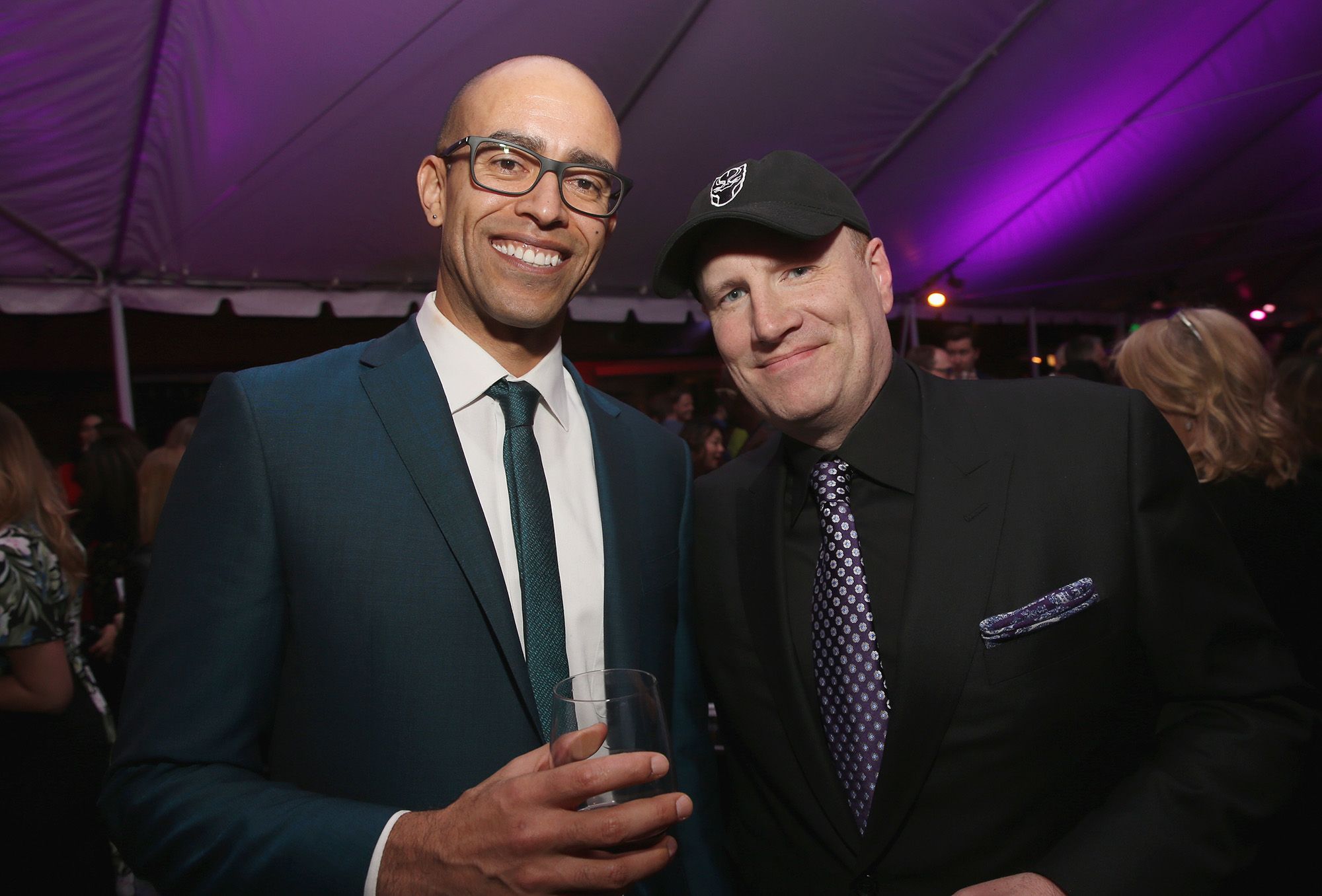
Black Panther is an incredibly important story for black audiences. Not only will we see a black super hero but we’ll see one who is the wealthiest black super hero in the most technologically-advanced nation. My question is, how much of the wealth and prestige of T’Challa and Wakanda will we see in this film?
Nate Moore: I think you’ll see all of it. The Golden City is, we think the most amazing city in the world in a way that also feels grounded. What we were very afraid of was making Wakanda almost too Kirby-esque and by that I mean making it feel almost like they’re alien and not human. The truth is they’re human. They’re just 20 or 25 years ahead of us. Having a city built on Vibranium allows them to have all these advances and have wealth beyond our wildest imaginings and that’s a big part of the movie. As far as the technologically-advanced side, in our mind, and in our incarnation, Shuri is the head of the Wakanda Design Group. She’s the smartest person in the world, smarter than Tony Stark but she’s a sixteen year old girl which we thought was really interesting. Again, black faces in positions of power or positions of technological know-how, that’s a rarity. So it’s something that’s a big part of the film.
Just a follow up to that, you mentioned Tony Stark. Will you depict the fact that T’Challa is in fact wealthier than Tony Stark?
Nate Moore: We don’t put a — it’s not a plot point, you know what I mean? I think it’s inherent in what you see without us having to point it out directly. We think the Black Panther and the world of the Black Panther lives without having to make comparisons or see characters from other films. There are so many characters in the Black Panther world that we wanted to explore, we didn’t want to rely on cameos from other movies. So I wouldn’t expect that, nor did we want to have to make those direct line comparisons but I think it’ll be obvious.
Going off of that, do we get a sense of how the people of Wakanda or the people around T’Challa feel about his role in Civil War and how he was fighting alongside Tony Stark and fighting Captain America?
Nate Moore: Yeah. That’s part of the movie, right? What happens when your now new leader has potentially exposed a big secret to the world and how do you recover from that? I don’t think everybody in Wakanda was super happy that he was out there. I think people understood. Obviously the death of T’Chaka was such an emotionally changed thing. I don’t think people didn’t understand why he did it. But they weren’t happy about it. And again, for a country that values its secrecy so much, that was a big deal.
Will this movie explore the more spiritual side of it and the city of Necropolis?
Nate Moore: It is. I mean, I think in addition to Vibranium, a big part of the movie is the heart-shaped herb and with that comes the more spiritual and ancestral side of Wakanda that we explore.
Panther gods too?
Nate Moore: I think you might see a little bit of that. Again, we thought this mythology was so rich we didn’t want to throw out any part of it. What’s interesting about Wakanda that we always found fascinating was it’s not only the most technically-advanced civilization in the world but it has a very strong ancestral history that was never eliminated in a way it has been in other places because they were never conquered. So imagine a place that still has standing monuments that are centuries old, next to the most modern skyscrapers in the world. In the same way, they haven’t lost a lot of their cultural touchstones that other places have. They still worship, potentially the same gods they did when they first started. They still have rituals that are centuries old because they never had that sort of cultural imperialism that you’ve seen across the world. So it’s a place that really sits between being technologically advanced but also having a high value on their traditions.
You mentioned this movie isn’t going to rely on any cameos from other Avengers movies. Is it safe to assume that The Winter Soldier is still on ice and isn’t going to factor in at all?
Nate Moore: That is pretty safe to assume.
Scott Derrickson talked a lot about the freedom that he had on Doctor Strange and getting to just tell a Doctor Strange story that happened to be in the MCU. Obviously this is a little more linked to the MCU coming out of Civil War. How interlinked with the MCU is it and how much does that dictate what you’re able to do with the story?
Nate Moore: I think it’s inherently linked because of the Civil War connections and because of the Ultron connections with Klaue. So there are strings that we are playing with. But again, much like Doctor Strange, we felt this had enough storytelling that it could stand alone beyond those things. We wanted to give Ryan the freedom to tell a story that wasn’t relying on other things that were happening in the MCU. Now that doesn’t mean what happens in the film won’t have ripples in the MCU but the film itself isn’t relying on other plot points in the MCU.
When you started the process did you have a completely blank slate or were there overarching story beats that you had to support?
Nate Moore: We had a pretty blank slate. We knew we were inheriting stuff from Civil War. We had ideas of what we thought we could explore and we sort of built it with Ryan and Joe Robert Cole who wrote the script with Ryan. They had a lot of latitude to explore different ideas and put characters in and take them out. But it wasn’t, by any means, hemmed in by things that we’d thought of.
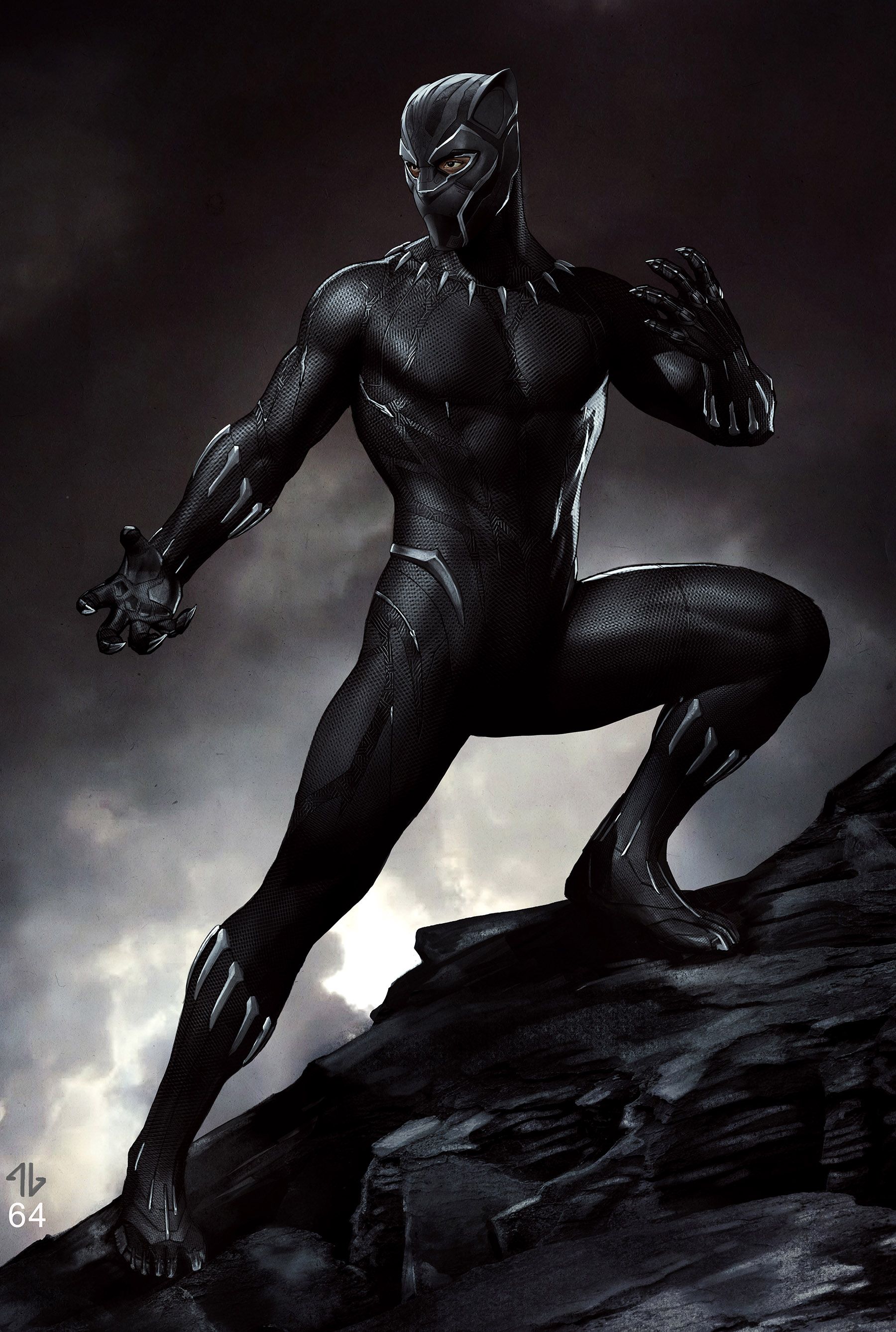
Will you have to support anything that comes after?
Nate Moore: No. Again, we try not to do that, especially with these standalone franchises, to make them set things up specifically. Sometimes it’s a happy accident that they do. Again, Civil War is a good example of that. It was never the intention of that movie in the beginning to set up Black Panther. But it was a storyline that sort of dovetailed really nicely into it and allowed us to build this stand-alone movie. I think this is similar. It’s not meant to set up anything else specifically but again, there are storylines in this movie that could potentially spin off to do other great things.
One of the things that Civil War did so well was that it was kind of a rarity in the entire super hero universe in that it had high stakes but it wasn’t the end of the world as we know it, a huge apocalypse type thing. Was that something, because audiences responded so well to that, that you guys took into account when making this?
Nate Moore: Yeah, I think we’re eternally very wary of “the world is going to end” stakes. Because it’s exhausting and weirdly those stakes being that high always ring false. It always take you out of the movie because you know the world isn’t going to end. What’s really at stake? We wanted this film to feel more grounded and to have stakes that felt like they could happen and maybe they do happen because I think it’s a better ride for our audiences. Also I think villains who want to take over or destroy the world are kind of exhausting. That doesn’t feel real, right? That’s not stuff that any of us at this table want to do so it always, I think distances you from the villain a little bit. It’s always better to have a more personal, pointed goal. It just makes it more interesting.
Obviously this is an original story. Are there any specific runs of the comic that they were inspired by?
Nate Moore: I would say the two runs that were most inspirational were the Priest and Ta-Nehisi run.
Thank you. It’s the best run. I was curious to know was there any consulting done by either Priest or even Hedlund or Coates?
Nate Moore: Ryan and Ta-Nehisi have a friendship, so they’ve spoken. Both Ryan and I have spoken to Chris who is incredibly smart and obviously I think did the seminal run on the character so far. We’ve talked to them. It hasn’t gone so far as consulting but we always wanted to pick their brain as far as what they found interesting about the character and the world. And it turned out that a lot of what they found interesting was what we also found interesting. We loved Reggie’s run. We didn’t talk to him as much. It was really Chris and Ta-Nehisi runs that were the most inspirational.
Going off of that, with the publishing, you said you guys just tried to be inspired. Was there something tangible that you guys said “no we really want to stick as close as possible” maybe from the below the line costuming or some of the visual looks?
Nate Moore: Yes and no. I think there were definitely some inspiration points, especially design-wise that we got form both Chris and Ta-Nehisi’s run. Brian Stelfreeze is an amazing artist and some of his version of Wakanda and even Wakanda technology was stuff that we borrowed pretty liberally from. But there’s also a lot of original Ryan Coogler and Hannah Beachler who is our production designer, a lot of their ideas that are outside of publishing that we found interesting.
Again, one thing we really wanted to explore was real Africa and real African inspiration and grounding it in stuff that was terrestrial and sometimes comics are beautiful but feel so far in mood from what we know as real that they become too heightened. One thing I think Hannah did well was exploring actual African culture and actual African design and infusing it with this cool new future tech to make it something completely new that I think is really interesting.
One thing I’ve always found curious about Wakanda is the fact that it is the size of New Jersey. It’s a very small place. I’m curious, in that sense how we’re going to be exploring the geography of the entire country?
Nate Moore: Yeah, as small as it is, it does have a lot of different environments that we wanted to explore. We didn’t want it to feel like it was a city. Sometimes in comics it just feels like a city. Wakanda has different regions which is cool. It has different climates and we wanted to go through all of those. And another big thing, again because it is a hidden society in a way that it’s never been in publishing, what is the public face of Wakanda versus the real face? I think you’ll get a sense of how they’ve been hidden for so long and what is actually behind the curtain. All that is part of the storytelling.
Can you tell us anything more concrete about the specific cultures or specific types of technology outside of the comics that you looked to for inspiration?
Nate Moore: It honestly was everything. We sort of scoured the continent for the best stuff. Part of the storytelling was that Wakanda was one of the first peoples and as they spread out they took their traditions and their architecture and their pottery with them and that became the basis for Kenya and that became the basis for the Central Republic of the Congo. So it allowed us then to pull from everywhere rather than just saying it’s just inspired by this one place, because there’s so much great design honestly. We wanted it to be, in a way, a love letter to Africa which you don’t get to see a lot on film.
Was there a story logic to the hidden quality like why they decided to be hidden away?
Nate Moore: Yes. If you think about the way the world works, whenever any culture has something of value, it tends to draw a lot of eyes and tends to draw you into conflict frankly. I think Wakanda so very early on that if people knew they had Vibranium, which they do, they were going to be conquered or at least be at war forever. So they did the smart thing. They hid that fact so nobody knows that they have this stuff. That’s why they’ve been able to have these advancements. They don’t spend money on war. They don’t spend money defending themselves constantly. They just spend money on infrastructure which is something, again that will feel topical. Just that idea of what happens when you’re not 24/7 trying to fend off the rest of the world. By hiding in plain sight and being what we think people think of as a small African nation, poor farmers, shepherds, textiles, people leave them alone. That’s allowed them to build something amazing.
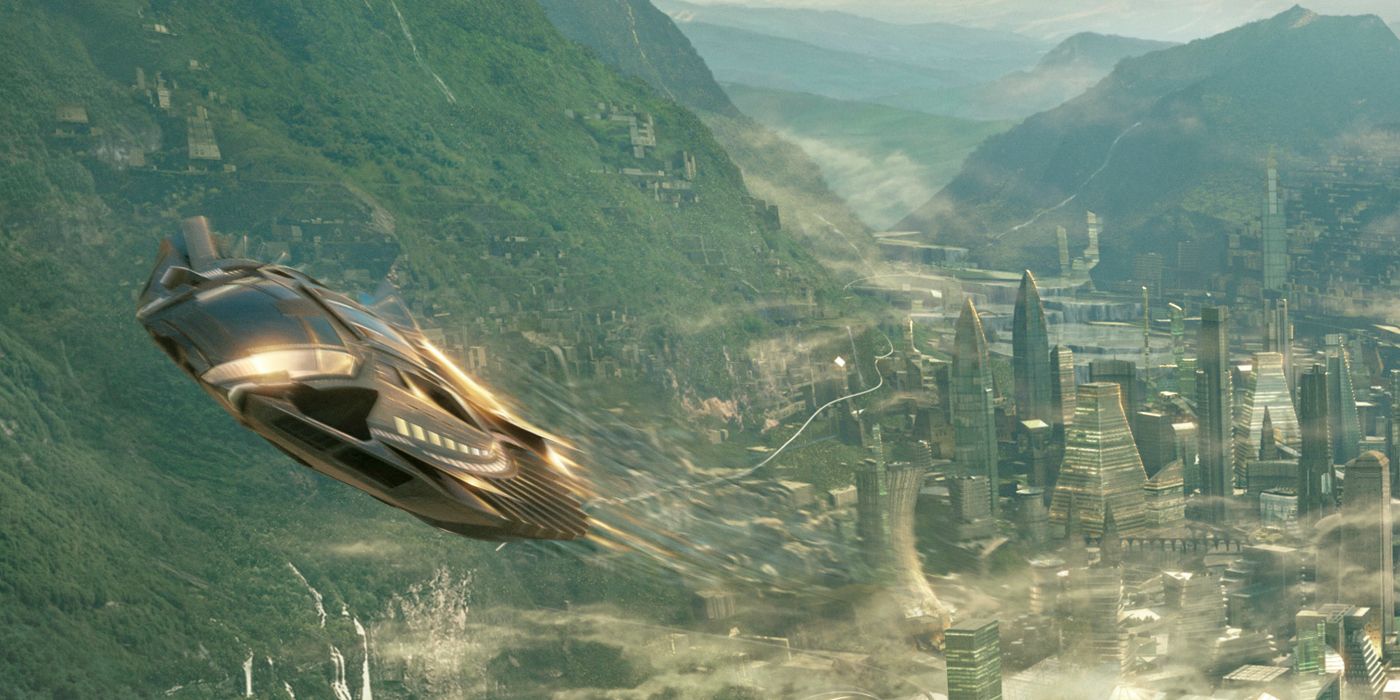
Do you look at Wakanda as almost being a character the way that it’s one of the only fictional locations in the Marvel Universe. As much as New York City can be a character for a Spider-Man story, is Wakanda so unique that it almost pulls people towards it?
Nate Moore: Absolutely. That was an important part. And a lot of early work in pre-production was defining Wakanda and giving it districts and giving it neighborhoods and showing you where the different hives may live and why they live there and how their society was built. It allowed us to map out a story that felt organic rather than trying to force in different things. We wanted all of these ideas and all of these characters to live in a real world so that relationships are even defined by what tribe you’re from. We thought that was really interesting. Even characters that were fraught with plot, they become politically charged. The character of M’Baku has always been problematic. Man Ape is an image that I personally find offensive and can be offensive if handled incorrectly. But the idea of the character that we especially borrowed from the Priest run specifically, of this guy who is the head of the religious minority in Wakanda, that’s fascinating. That’s something that’s real. That’s something that we felt we could ground and give him a real character story that made him worth including. So defining the world of Wakanda and how M’Baku and the Jabari fit in that world was important in making that character work at all. Otherwise, we would have just taken him out.
Can you give us a scale of the film as far as the locations. Are we going to see one or two or —
Nate Moore: You get to go around the world a little bit. We thought that was important. Again, sort of in our James Bond comparison we wanted it to feel like it did have some scope and wasn’t just a movie that was set in Wakanda. Not that Wakanda isn’t fascinating and not that we couldn’t explore that forever, but it did want to feel like a movie that had ramifications beyond the borders. So you do get to be outside of the country as well as explore the country.
To speak to tone a little bit, Marvel has a long history of really fun films. Black Panther is a very serious character. I’m curious where the humor is going to come from and knowing Priest’s run if we can expect that from Everett Ross?
Nate Moore: Ross is an important character in the movie for sure. I think tonally this does veer more toward Winter Soldier than it does Guardians or Ant-Man or some of our more overtly comedic films. I think the fun comes from the interaction of these characters and I think as much as even Panther tends to be serious, Shuri doesn’t always have to be serious. Okoye is a lot of fun. The character of Nakia who Lupita Nyong’o plays is a lot of fun. It’s surrounding him, much like we did with Cap, with characters who can bring out different colors. It won’t be Guardians. Hopefully it’s still entertaining without breaking what makes Panther Panther.
Can you talk a little bit about the Villain in this movie and what the Black Panther is going to be going up against? I know you said it’s going to be a power struggle but is there more to it than just like getting some power?
Nate Moore: Yeah, I think the antagonists in the movie all have very specific, personal reasons for opposing T’Challa. I think Klaue, obviously has a history of Wakanda that we want to explore. It was hinted at in Ultron and will be expanded on here. And Klaue has made some upgrades to himself that allow him to be a formidable enemy. That idea of an outsider who knows — who is maybe the only person who knows about Wakanda, as well as the internal struggle allows us to have antagonists coming from multiple angles. It’s not just about power. I think there are very personal reasons why anybody opposes T’Challa.
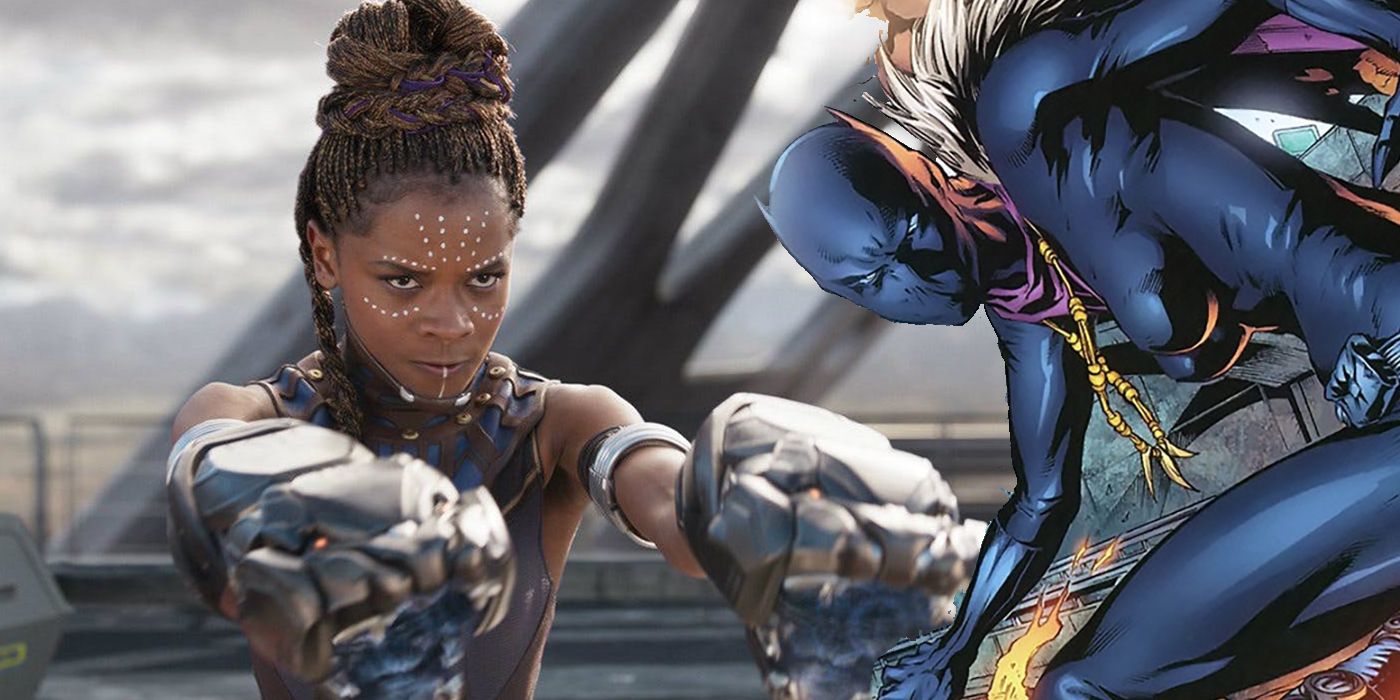
You mentioned Shuri. She’s going to be in the movie? Who is playing Shuri?
Nate Moore: A younger actress named Letitia Wright who is out of the UK.
How much of a presence is Shuri going to have? She’s a prolific character.
Nate Moore: She’s a big part of the film. Yeah, look she’s his sister. So she’s going to be next to him in a lot of these adventures, a lot of these scenes. Again, our Shuri is the Head of the Design Group so it’s a bit of a different tact than you’ve seen in comics before. But she, like T’Challa, lost her father in the last film so that’s going to resonate with her as well. And being the Head of Technology in Wakanda has a ton of responsibilities. Part of that responsibility is keeping that technology secret while developing these amazing gadgets. As the walls start to close in, what does she have to do to make sure what she’s done stays out of the wrong hands?
Does this mean, like a Bond movie then, does she serve as T’Challa’s Q?
Nate Moore: To some degree. That’s a compassion we’ve made. We didn’t want it to be that one to one but for sure she’s a big reason that T’challa gets into gadgets in the film.
We’ve talked about the tone compared to MCU. But what about the action? This is obviously an action movie too. We love seeing Black Panther kick ass in Civil War. How would you compare the action and what are we going to see that’s different here than even Black Panther’s appearance in Civil War or what we’ve seen in other MCU movies?
Nate Moore: Yeah, I think much like Civil War and Winter Soldier before it, because the character is a little more grounded than Thor or Hulk or Guardians, the action is going to be more grounded as a result. But I think the way Panther fights, the way the Dora fight, is unlike anything you’ve ever seen because their culture is so different. It’s not just stand up, bare knuckle punching. It’s a new fighting style that again borrows from a lot of different fighting styles from around the world. We wanted it to feel like — they’ve been off the grid doing their own thing so whatever they do should feel distinct. It shouldn’t feel like what you or I can see in any other movie. They have weapons that are weapons we haven’t seen before. They have vehicles we haven’t seen before. Imagine a whole world that is going to open up to audiences. I think it’ll be a lot of fun.
You talked a little bit about how the outside world sees Wakanda. How much are we going to see about how people in Wakanda see the outside world? Obviously we’re going to see how Black Panther feels about it but the average citizen for example?
Nate Moore: I think you’ll get a sense for how Wakanda sees the outside world, and sort of both the good and the bad. I think you will see some characters who have a longing to be more a part of the outside world and other characters who feel like it’s good that we’re separate because the outside world is so flawed. Again, that’s where, without being heavy handed, some of that political context could leak in. It’s just a natural part of the storytelling when you’re talking about a society that is both a part of the world and totally separate.
Can you speak to some of the maybe alterations or additions, changes to his actual costume as Black Panther. As we know, the costumes tend to change a bit between films?
Nate Moore: We always love the idea of giving the audience something new. You’ll see the Civil War costume and you’ll see 2.0 of that. That again will be a part of Shuri’s contribution. She’s seen what the costume can do. She’s seen the limitations of the costume and she may have some ideas of how to upgrade that costume to give him a little bit more juice.
Does that include sort of like the new run where it’s sort of like Iron Man, like it’s his skin?
Nate Moore: We’ve talked about that. It’s something we’re still developing. But we like the idea that the costume doesn’t have to be put on in a traditional way. That he doesn’t have to take the helmet off, put it on, zip up the back.
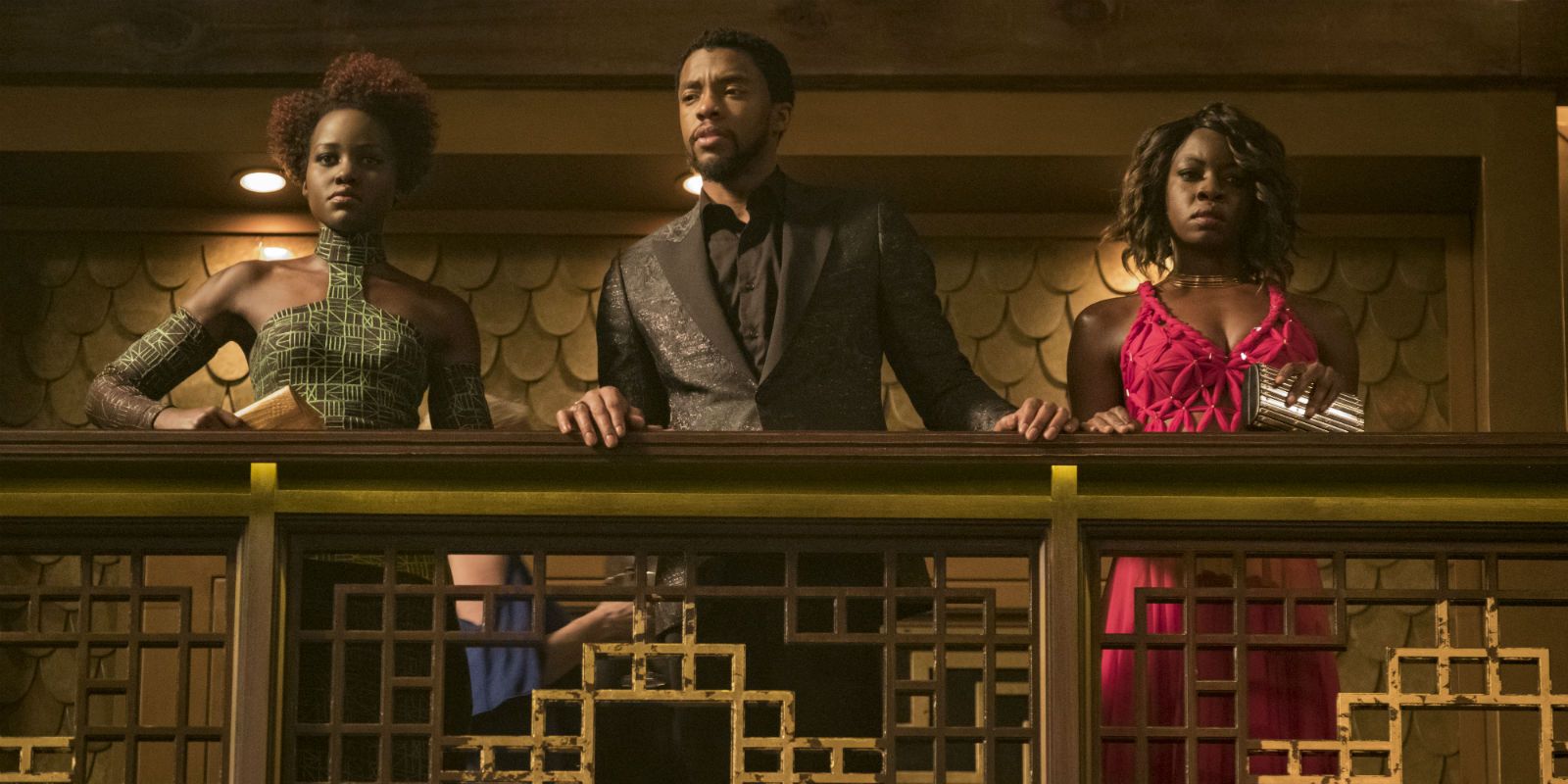
Is there a visual depiction of the history of the Black Panther in the movie?
Nate Moore: That’s a good question. I don’t know if there’s anything as pointed as that. I think even just in the architecture and some of the dressing you’ll get an idea of Panthers throughout the centuries. And I think that’s something that will dial to taste. I think we’ll see a little bit of it but I don’t know that it’ll be a big part of the film.
Wakanda itself was first hinted at in Iron Man 2. Obviously it’s a big part of the comics and I know that Marvel has been developing a Black Panther movie for a while. Was there ever any chance that we were going to see Wakanda before this movie or was it always held for this?
Nate Moore: We talked about it. And the truth was, there was so much to bite off that we didn’t want to waste it. We could have gone there a couple of times before. There were iterations of other scripts where we did go to Wakanda. But we didn’t want to tease it without a full idea of what it was going to be. We didn’t want to start locking into ideas without having a story or a filmmaker who had a full understanding of what the country was. All of those ideas fell to the wayside until we could spend a full movie on it.
Marvel hasn’t been shy about casting big name actors. But this cast is a cut above. The list, every single one of them is award-winning, award-nominated, celebrated actors. Can you talk about the casting process and just the idea of being able to actually give all of these amazingly talented people something to do?
Nate Moore: Yeah, I think that’s the biggest challenge. We always try to punch in a little bit above our weight when we cast. Ryan came to the table with a lot of casting ideas that were really good. And the truth is, because of the subject matter, we were able to get a lot of people we didn’t think were really interested. But the challenge then is when you have the cast that we have, Angela Bassett, Forest Whitaker, Daniel Kaluuya, all these great up and coming actors, all these great classic actors, the challenge is giving them all something to do. And it was hard. Much like Civil War, you want to give everyone a moment or a beat or a mini arch so you don’t feel like you’re wasting anyone. I think Ryan and Joe Robert Cole have done that but even we were shocked with the caliber of cast. Truthfully. We went after some people we thought “there’s no way they’re going to want to do it” but they did. I think a big part of that was Ryan. And I think a big part of that was the subject matter.
Do you think a lot of that has to do too with the fact that when we talk about the MCU in general, Black Panther is a storyline that us black nerds have been like “yes please.” So that talks to the casting but can you talk to some tangible things you’re looking to do after this film to widen it up and see more of those faces in the other MCU properties?
Nate Moore: Yeah, look, we’ve always tried to find room for faces that look like everybody and not just homogenous casting. Panther obviously is a big swing that we hope to continue through many sequels and take some of these characters and put them in other franchises because I do think there’s a way to cross-pollinate in an interesting way. But it’s also finding new heroes and new stories that allow us to do that organically. Looking at casting as a way to find the best actor regardless of race or gender frankly. Sometimes we step in it a little bit. I think the Ancient One in Doctor Strange was a bit of a lesson for us. In trying to avoid a stereotype we created an issue that we completely understood in hindsight. But we want to tell stories for everybody. I always point to the Fast and Furious franchise as sort of the standard bearer for casting a film that travels everywhere because somebody is represented no matter where you go. I think that’s really valuable. I think it does something culturally that it’s hard to put a finger on but that really pays off.
To just kind of dovetail on that, did you see some of the social that came out immediately following the casting because we were talking about #BlackPantherSoLit and did you all discuss that?
Nate Moore: We did! We pay attention to all that stuff. It gets us excited when people are excited. We don’t take that for granted. We don’t assume people are going to show up to any of our movies. So when people get as excited as they were getting for Panther we were like “oh, we’re on the right track. This is great!” It’s heartening for us. We want to hear back from everybody. Kevin has always said he’s on the side of the audience. He wants people to love the movies as much as we love the movies. So all of that stuff we track for sure.
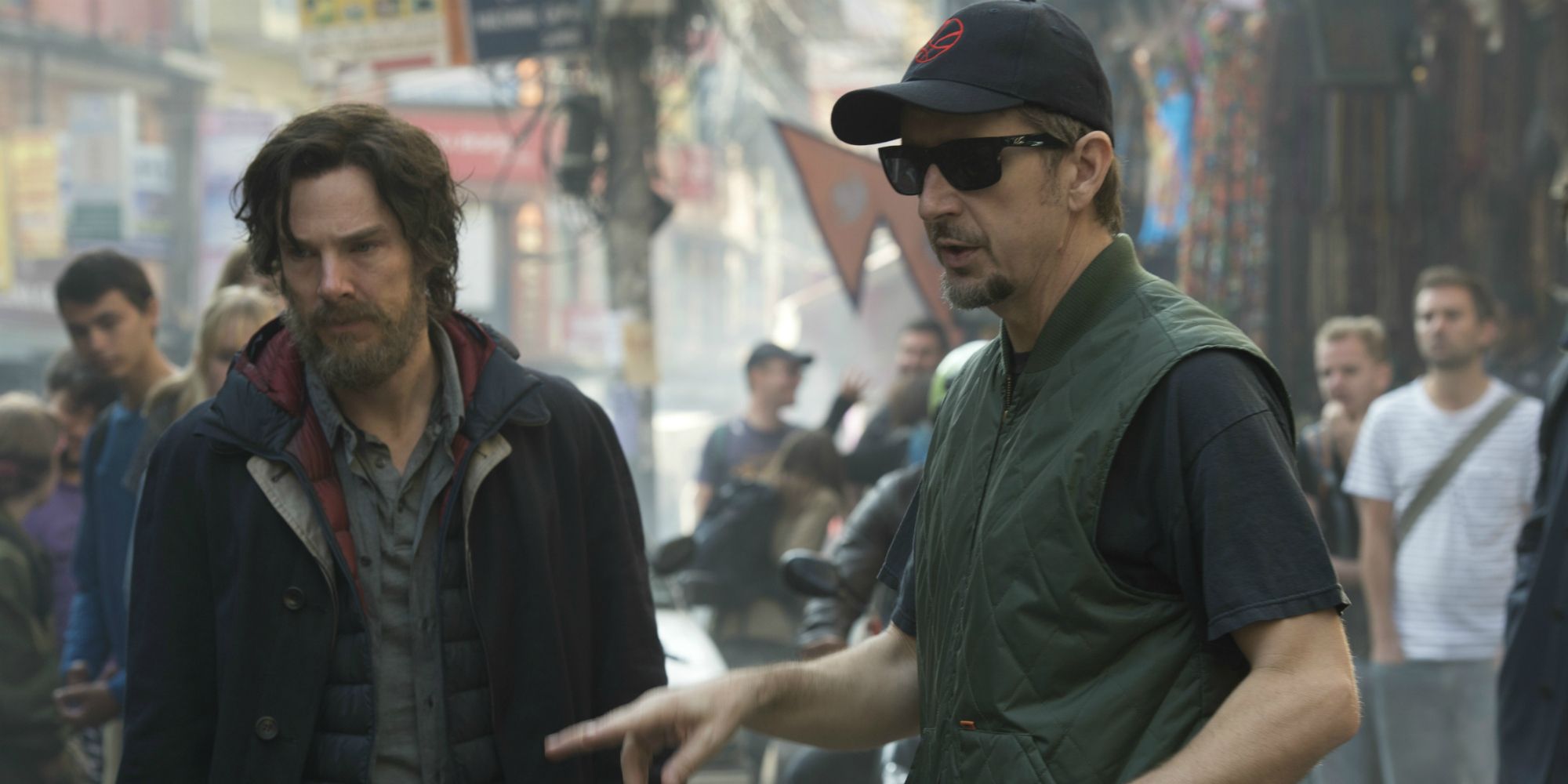
Scott Derrickson talked about having to do an elaborate pitch to get Doctor Strange. I’m just wondering did Coogler bring something to the table similar to that or did you guys watch Creed and go “that guy”?
Nate Moore: We kind of watched Creed and said “that guy.” Then we hunted him down and made him say yes. But it was hard. To Ryan’s credit, he obviously knew the character and wanted to do the movie but only wanted to do the movie if he felt like it was going to be something that would have integrity, that at the end of the day he felt good about as a filmmaker. And that’s what we wanted as well. I think Marvel has a reputation, earned or not, as being a difficult place for filmmakers. Once Ryan came in and met us all and heard what we had to say about the character and process-wise, I think he felt really comfortable. Look, we’re in the middle of it, it’s been a good four weeks and we feel really good about what we’re getting. I think the movie is going to be fantastic and I think a lot of that is because of Ryan.
You’ve only been shooting for a few weeks but once you actually start principal photography, new things present themselves, new things in the story present themselves. Are there any surprises so far, new things that you noticed the story is starting to take on a life of its own?
Nate Moore: It’s a more emotional movie than we anticipated, I think in a good way. When you read a script a million times you start to just look at it from a plot perspective and make sure all the characters are tracking and the actions are going to be cool. And when living breathing humans bring those characters to life, interacting with each other. It’s that next level of “oh these are real people” and their responses to things are not just plot driven, they’re driven by emotion and I think, again because our cast is so talented, up and down the board, some scenes that we felt like were pretty good scenes that would get us to the next scene, are amazing scenes because the performances are so strong. I don’t think we imagined how emotionally impactful these scenes would be. Whether or not we can stitch it all together into a movie that works, but it makes us more excited. We go “oh this is going to feel a little different and have a gravity that is going to still be entertaining but maybe is a little bit different than some of our lighter movies” that’ll make this film its own thing.
Next: Michael B. Jordan Interview from the Set of Black Panther
Marvel Studios’ Black Panther follows T’Challa who, after the death of his father, the King of Wakanda, returns home to the isolated, technologically-advanced African nation to succeed to the throne and take his rightful place as king. But when a powerful old enemy reappears, T’Challa’s mettle as king—and Black Panther—is tested when he is drawn into a formidable conflict that puts the fate of Wakanda and the entire world at risk. Faced with treachery and danger, the young king must rally his allies and release the full power of Black Panther to defeat his foes and secure the safety of his people and their way of life.
Black Panther is directed by Ryan Coogler and produced by Kevin Feige with Louis D’Esposito, Victoria Alonso, Nate Moore, Jeffrey Chernov and Stan Lee serving as executive producers. Ryan Coogler & Joe Robert Cole wrote the screenplay and Black Panther’s cast includes Chadwick Boseman, Michael B. Jordan, Lupita Nyong’o, Danai Gurira, Martin Freeman, Daniel Kaluuya, Letitia Wright, Winston Duke, with Angela Bassett, with Forest Whitaker, and Andy Serkis.




